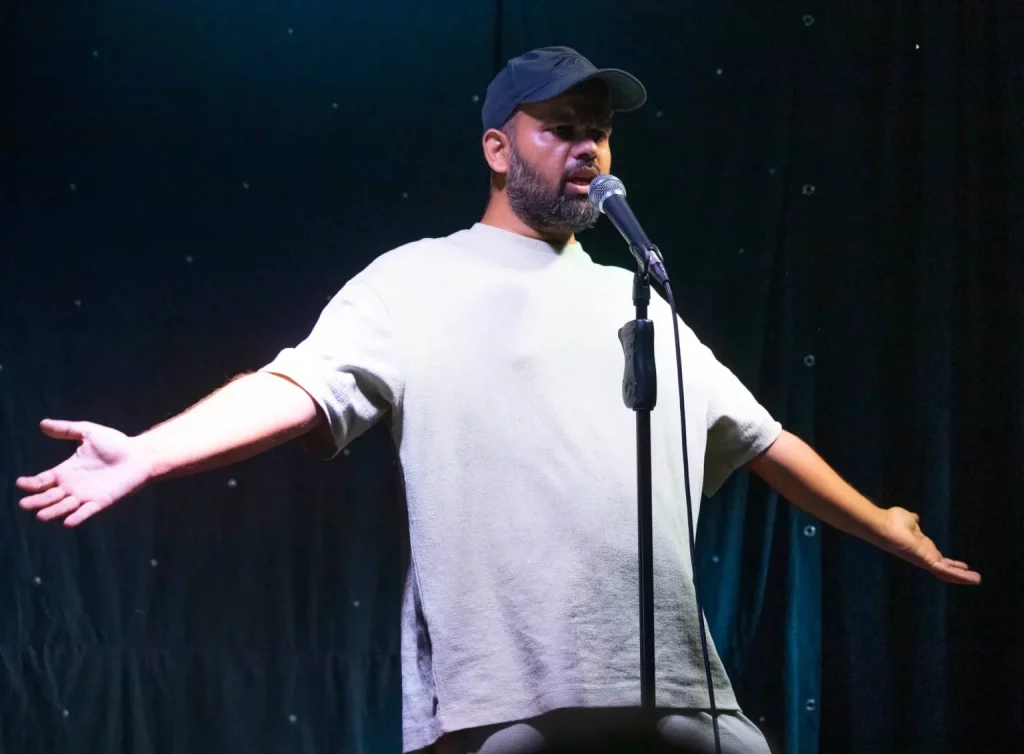‘Racist’ and ‘immigrant’ are two words rarely put so closely together. It’s almost as though they are diametrically opposed whenever they’re mentioned. But in one of Sydney Fringe Festival 2024’s strongest line-ups, four comedians share the stage (on separate nights) and fuse these words with the ultimate taboos. Gender roles, the spectrum of fatness, airline weight limits and life-threatening family expectations become the glue comedians Wandi, Delhi Buoy, Aditya Gautam and Paul The Black thrill their audiences with over the four-week run.
While the selection of comedians varies with each performance, the night of 17 September opened with Aditya Gautam, master of toying with the fourth wall. As a multidisciplinary being—author, copywriter, screenwriter, content marketer, and stand-up comedian—Gautam opens the routine with a brief introduction to the evening and himself and follows it up with a series of rapid-fire gags at the expense of SBS, multicultural Sydney, papadums, and anything else remotely related to being an ethnic Australian.
Gautam stood out for the audience (and undoubtedly for this reviewer). When he was taking a dig at insecure gym junkies, he stared directly at my brother – a loud and proud semi-bodybuilder who laughs at my aqua aerobics and reformer Pilates pursuits – and poetically asked and responded:
“How much do you squat?”
“160 kilograms.”
“F**k you.”
Sharp and witty full-circle moments are Gautam’s strength, albeit interrupted by ‘side jokes’ sprinkled with crude language that unfortunately don’t always land. However, his candour manages to establish a rapport between him and the audience,
With the conclusion of Gautam’s routine came the biggest surprise. Neema Naz, Iranian-Canadian stand-up comedian, actor and content creator, came running down the aisle of Sideshow at The Rocks completely unannounced. After a killer warm-up act for Omid Djalili a few nights previously at Enmore Theatre, Naz’s appearance at Sydney Fringe was perfectly aligned.
Audience interaction and physical comedy were the standouts in his routine. The moment Naz picked out the Iranian side of the room, I and three other relatives, became the target of many of his zingers. And when he saw the notebook hidden underneath my cardigan, a ceasefire followed and an A+ was begged for. Pair this with his uncanny impression of a wok flipper and his Filipino accent (verified by the Filipino tourists in the room) and the audience was left questioning just how racist immigrants can be…
Given his wide Iranian and Middle Eastern-based following on social media platforms, much of Naz’s live content is rooted in the experiences of these groups. However, in no way is this conventional or culturally ‘appropriate’. And that’s what makes his jokes land so successfully. Masturbation – for one – is something no one wants to hear discussed while sitting a few centimetres away from their mother, but that doesn’t stop Naz from making it the focus of one of his longer jokes.
Nevertheless, breaking these taboos through the channel of comedy is admirable, particularly for comedians coming from cultures where propriety and formality are so ingrained. Producing a show that breaks down barriers of conversation through comedy is no mean feat for comedians. Thankfully, Naz is seasoned in achieving this.
To feel referenced and seen in the most literal way possible is an experience I wish for every member of every diaspora scattered across the Earth. Seeing Naz, particularly as a second-generation immigrant vulnerable to community rejection and isolation, alongside other members of his global community like Djallili, Max Amini and Maz Jobrani, can only be described as heartwarming.
First published by ArtsHub on September 24, 2024. This article has been commissioned in partnership with Artshub for Diversity Arts Australia’s StoryCaster project, supported by Multicultural NSW, Creative Australia and Create NSW.

